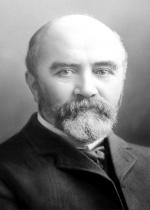John Griffith (engineer)
| John Griffith | |
|---|---|

Sir John Purser Griffith
|
|
| Born | 5 October 1848 Holyhead, Wales |
| Died | Script error: The function "death_date_and_age" does not exist. Rathmines Castle, Dublin |
| Nationality | Irish |
| Education | Trinity College, Dublin |
| Spouse(s) | Anna (Nina) Purser |
| Children | John Griffith, Alice Elsie Griffith, Frederick Griffith |
| Parent(s) | Reverend William Griffith, Alice Griffith |
| Engineering career | |
| Engineering discipline | Civil |
| Institution memberships | Institution of Civil Engineers (president), |
Sir John Purser Griffith (5 October 1848 – 21 October 1938) was an Irish civil engineer and politician.[1]
Griffith was educated at Trinity College Dublin and gained a licence in civil engineering in 1868.[2] He served a two-year apprenticeship under Dr Bindon Blood Stoney, the Engineer in Chief of the Dublin Port and Docks, before working as assistant to the county surveyor of County Antrim. He returned to Dublin in 1871 and worked as Dr. Stoney's assistant, becoming the Chief Engineer in 1898 before retiring in 1913.[2]
He served as president of the Institution of Civil Engineers in Ireland between 1887 and 1889 [3] and of the Institution of Civil Engineers between 1919 and 1920.[4] He was elected Commissioner of Irish Lights in 1913 and was a member of the Royal Commission on Canals and Waterways between 1906 and 1911.[2]
Griffith purchased and drained the bogland at Pollagh, part of the Bog of Allen, a peat fuelled power station was built which drove an excavator, excess peat being taken by the Grand Canal for sale in Dublin.[5] The site was sold to the Turf Development Board in 1936 who used it as a basis for all of their later peat fuelled power stations, the area is now a nature reserve.[5]
Griffith received a knighthood in 1911 and became vice-president of Royal Dublin Society in 1922. He served as Honorary Professor of Harbour Engineering in Trinity College, his alma mater, and received an honorary M.A.I. degree from the University of Dublin in 1914.[2] From 1922 he was an elected member of the Seanad Éireann, the Irish senate, until its abolition in 1936.[6] In the 1930s he and Sarah Purser, endowed the Purser Griffith Travelling Scholarship and the Purser Griffith Prize to the two best performing students in European Art History at University College Dublin.[7]
He died at Rathmines Castle in Dublin on 21 October 1938.[1]
References
- ↑ 1.0 1.1 ICE Obituary
- ↑ 2.0 2.1 2.2 2.3 Royal Dublin Society biography
- ↑ ICEI past presidents
- ↑ Lua error in package.lua at line 80: module 'strict' not found.
- ↑ 5.0 5.1 Lough Boora Parklands
- ↑ Lua error in package.lua at line 80: module 'strict' not found.
- ↑ University College Dublin prizes
| Professional and academic associations | ||
|---|---|---|
| Preceded by | President of the Institution of Civil Engineers November 1919 – November 1920 |
Succeeded by John Alexander Brodie |
Lua error in package.lua at line 80: module 'strict' not found.
- Articles with hCards
- Irish civil engineers
- 1848 births
- 1938 deaths
- Presidents of the Institution of Civil Engineers
- People associated with Trinity College, Dublin
- Members of the 1922 Seanad
- Members of the 1925 Seanad
- Members of the 1928 Seanad
- Members of the 1931 Seanad
- Members of the 1934 Seanad
- Members of the Senate of Southern Ireland